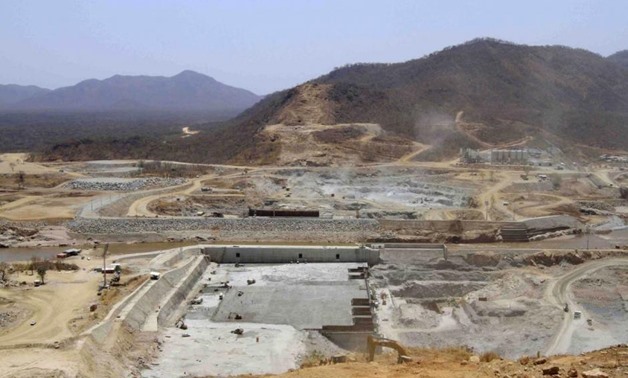
FILE- A general view shows construction activity on the Grand Renaissance dam in Guba Woreda, Benishangul Gumuz region in this March 16, 2014 file photo. REUTERS/Tiksa Negeri/Files
CAIRO – 10 February 2019: The three leaders of Egypt, Sudan and Ethiopia met Sunday, and ensured their commitment to not harm their interests while reaching a consensus on outstanding technical issues of the Grand Ethiopian Renaissance Dam (GERD).
President Abdel Fatah al-Sisi, Sudanese President Omar el-Bashir and Ethiopian Prime Minister Abiy Ahmed met in Addis Ababa ahead of the convening of the opening session of the African Union, during which Egypt will assume the chairmanship of the continental institution from Rwanda.
The trio summit was meant to provide a political umbrella to support the technical negotiations regarding the GERD filling process, to overcome all obstacles in this regard and to enhance the cooperation among the three countries, according to a statement from the Egyptian presidency.
According to the statement, President Sisi assured the importance of guaranteeing a balanced and cooperative vision regarding the filling of the reservoir, to achieve the interests of the three countries.
The three leaders enforced their need to agree to a unified vision that abides by the principles stipulated in the 2015 Khartoum Declaration, said Egypt’s presidential spokesperson Bassam Rady.
The summit further tackled the trilateral relations, and ways of reinforcing them through intensive coordination regarding different issues of common interest.
Ethiopia started building the GERD in May 2011, immediately following the Egyptian 25 January Revolution. Cairo expressed its concerns over affecting its 55.5 billion cubic meters of the Nile water share. Since then, negotiations among the three countries were suspended for three years. However, talks resumed in 2014 and a Declaration of the Renaissance Dam Principles Charter tackling the management of the dam with written guarantees has since been signed. According to the charter, the dam’s reservoir cannot be filled without the approval of both Egypt and Sudan.
Although the completion of the multi-billion dollar dam was set to finalize in five years since its launch in 2011, the time-frame, given possible defects with the hydro-electrical plant’s equipment, extended to 11 years.
Assistant Foreign Minister to Africa Affairs, Wael Adel Nasr told Egypt Today that although the GERD is a real problem, “it still can be handled without tensions because Ethiopia’s leadership and people are smart and are fully aware of the situation.”
The dam has social and political importance to Addis Ababa, given its expected immense generation of hydro-power that would help in the country’s power shortage, and consequently having impact on education and health sectors. Besides, the completion of such a giant project is considered a huge political leverage for the people of Ethiopia.
Additional reporting by Nourhan Magdi and Samar Samir

Comments
Leave a Comment